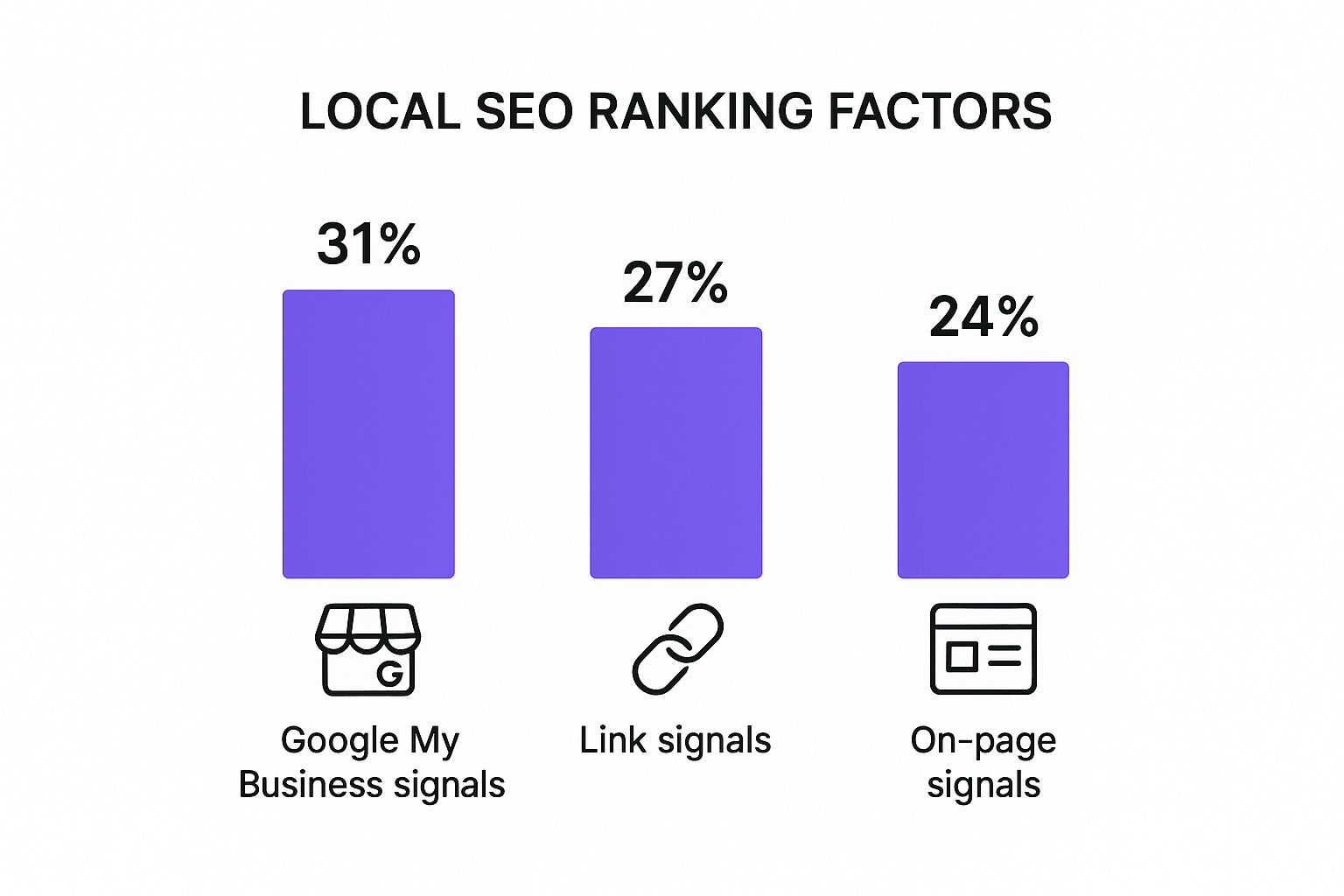SEO for Contractors Your Guide to Local Leads
Let’s cut to the chase. SEO for contractors is how you become the first call when a homeowner’s pipe bursts or they finally decide to gut their kitchen. Forget waiting for the phone to ring based on word-of-mouth. This is about showing up at the top of Google the second someone searches for "emergency plumber near me" or "best deck builder in [Your City]."
It’s your single most powerful tool for getting a steady stream of high-quality leads who are ready to hire. Right now.
Why SEO Is Your Best Tool for Winning Local Jobs
Not too long ago, a spot in the Yellow Pages and a few signs stuck in lawns might have kept you busy. Those days are over. Today, your customers’ journey starts with a search bar. They aren’t thumbing through a phone book; they’re typing their problems directly into Google, expecting an immediate, trustworthy solution.
This isn’t a small shift—it’s everything. Your online visibility is no longer a "nice-to-have." It’s the bedrock of a modern contracting business.
Good SEO puts you in front of potential customers at their exact moment of need. Think about it. It’s the difference between cold calling a list and having qualified homeowners call you. When a roof starts leaking during a storm, that person isn’t checking their mailbox for flyers. They're grabbing their phone. Your goal is to be the first name they see.
The Shift From Traditional to Digital
This complete reliance on search has changed the game for contractors. While referrals will always be gold, depending on them alone is a gamble. A solid online presence, on the other hand, gives you control over your lead flow. It makes your business predictable and ready to scale.
The real magic of SEO is that it connects you with people who have active intent. You're not interrupting their day with an ad they don't care about; you're showing up with the exact solution they’re desperately looking for. That’s why these leads convert at a much higher rate.
Getting serious about a search engine optimization plan isn't just another marketing expense—it’s an investment that directly hits your bottom line. A dedicated strategy can boost your leads by up to 50%. For contractors, that’s not just noise; it’s a powerful engine for real growth.
To give you a clear roadmap of what we're talking about, let's break down the core pillars of SEO.
Key SEO Concepts for Contractors at a Glance
This table breaks down the core SEO pillars we'll cover, explaining what each one means for your business and its ultimate goal, giving you a clear foundation from the start.
| Local SEO | Showing up in local map packs and "near me" searches. | Dominate your specific service area and attract nearby customers. |
|---|---|---|
| On-Page SEO | Optimizing your website's content and structure. | Tell Google exactly what services you offer and where you offer them. |
| Technical SEO | Ensuring your website is fast, secure, and easy for Google to crawl. | Make sure there are no technical roadblocks hurting your rankings. |
| Off-Page SEO | Building authority and trust through backlinks and citations. | Prove to Google that you're a reputable and trusted local business. |
Each of these pillars works together to build a powerful online presence that Google can't ignore.
Ultimately, SEO is the great equalizer. It allows smaller, local contractors to go toe-to-toe with the big regional players by owning their specific service areas. By zeroing in on local search terms, fine-tuning your website, and building an online reputation people trust, you make sure that when local customers search, your business is the one they find.
To see how all these pieces fit together, you can explore our comprehensive guide to SEO.
Finding the Keywords That Attract Ready-to-Hire Clients

Let's get one thing straight. The foundation of SEO that actually works for contractors isn't your slick website design or how many followers you have on Facebook. It all comes down to the exact words and phrases your future customers are typing into Google when their pipe bursts or their roof starts leaking.
Trying to rank for a broad term like "roofer" is a waste of time and money. It's a digital lottery ticket. You've got to get inside a homeowner's head and target the specific problem they need solved, right now.
Think about it. The person searching "roofer" could be a high school student doing a report. But the person searching "emergency roof leak repair in Denver"? That person has a bucket on their living room floor and their credit card in hand. That's the client you want. This is the whole game: targeting high-intent keywords.
Moving Beyond Generic Terms
Your goal is to show up for clients who are past the "just browsing" phase and are deep into the "I need to hire someone today" phase. These are the people ready to pick up the phone and ask for a quote. When you get this right, your website stops being a fancy online business card and becomes your best salesperson.
The difference in lead quality is staggering. In fact, SEO leads have a bonkers 14.6% close rate. That blows old-school methods like cold calling completely out of the water. This is why a smart keyword strategy is everything; it brings in better leads that are practically pre-sold on hiring you. You can see more stats on how SEO smokes other channels over at Intergrowth.com.
This all boils down to understanding what someone intends to do when they search. Are they looking for DIY tips, or are they looking for a pro?
Identifying High-Intent Local Keywords
So, how does this look in the real world for different trades? It's usually a simple formula: service + location + a qualifier that signals urgency or a specific need.
Here are a few examples straight from the field:
- For an electrician: Forget "electrician." Go for "install ceiling fan Phoenix" or "24-hour emergency electrician near me."
- For a landscaper: Ditch "landscaping." Target "backyard drainage solutions Austin" or "sod installation cost Dallas."
- For a remodeler: Instead of "remodeling," get specific with "kitchen remodeling estimate San Diego" or "cost to finish a basement Chicago."
These phrases are focused, local, and scream "I'm ready to buy."
The most valuable keywords for contractors almost always include a service and a location. This simple combination filters out the tire-kickers and puts your business right in front of the local customers you actually serve.
Using Free Tools to Find Your Goldmine Keywords
You don’t need to drop a ton of cash on fancy software to get started. Google gives you some powerful tools for free, and the best one to begin with is the Google Keyword Planner. It's built for advertisers, but it’s a goldmine for SEO.
You can plug in your services and see what people are searching for, along with how many searches those terms get each month. This is crucial for deciding which keywords deserve their own dedicated service pages on your site.

Another dead-simple trick? Just use Google. Seriously. Type one of your main services, like "fence installation," into the search bar and pay attention to the autocomplete suggestions. That dropdown list is a direct look into your customers' brains—it's what real people are actually searching for.
Building your strategy around these high-intent phrases is the first—and most important—step to making sure your SEO efforts actually lead to paying jobs.
Dominating the Local Map Pack with Google Business Profile
Picture this: a homeowner’s air conditioner dies in the middle of a brutal heatwave. What’s their first move? They’re not flipping through the Yellow Pages or asking a neighbor for a flyer. They’re grabbing their phone and searching "AC repair near me."
The first thing they’ll see is a map with three local businesses staring back at them. This prime digital real estate is the Google Local Map Pack, and for contractors, it’s the most valuable spot on the entire internet.
Landing in one of those top three spots is a total game-changer. It puts your business front-and-center for customers who are actively looking to hire someone—right now. This isn't just about getting seen; it's about snagging high-intent leads the second they realize they have a problem.
But showing up here doesn’t happen by accident. It takes a meticulously optimized Google Business Profile (GBP). This free profile is your digital storefront on Google, and treating it like an afterthought is one of the biggest mistakes a local contractor can make.
Your GBP Is Your Local SEO Cornerstone
Think of your Google Business Profile as the command center for your local online presence. It’s where Google pulls info to decide if you’re a relevant, trustworthy choice for someone searching in your area. Getting this part right is absolutely non-negotiable.
Your optimization journey starts with the basics, but the details are everything. Make sure your business name, address, and phone number (your NAP) are 100% consistent everywhere online, especially on your website. Even a tiny variation like "St." vs. "Street" can confuse Google and hurt your authority.
Next, get granular with your service categories. Don't just pick "General Contractor." Dig deeper. Choose a primary category and then add secondary ones that nail down exactly what you do, like "Kitchen Remodeler," "Bathroom Remodeler," and "Deck Builder." This tells Google precisely which searches you should be showing up for.
Bringing Your Work to Life with Photos and Posts
Your GBP is where you get to show off your craftsmanship right in the search results. You should be consistently uploading high-quality photos of your finished projects.
Pro Tip: Before you upload any images, geo-tag them with the location where the job was done. This adds another powerful local signal to Google, reinforcing your footprint in the specific neighborhoods and towns you serve.
But don't just stop with a photo gallery. Use the Google Posts feature to share updates, flash sales, or spotlight a recent project. These posts show up directly on your profile and act like mini-ads, keeping your listing fresh and engaging. A quick post about a "custom fence installation in San Diego" adds timely relevance that Google’s algorithm loves.
Regular activity—adding photos, creating a post, responding to a review—signals to Google that your business is active and engaged. This can give you a nice little boost in the Map Pack rankings.
The Unspoken Power of Customer Reviews
For local contractors, reviews are the lifeblood of your reputation. A steady flow of recent, positive reviews is one of the most powerful ranking factors for the Map Pack. Even more important, a whopping 72% of consumers use online reviews to find local businesses.
Your job isn't to just cross your fingers and hope for reviews; you need a simple, repeatable system to get them.
Make it dead simple: The moment a job is done and the client is smiling, send them a direct link to your GBP review page via text or email.
Time it right: Ask for the review when their satisfaction is at its peak—right after they see the amazing finished work.
Respond to every single review: Thank customers for the good ones and professionally address any negative feedback. This shows potential clients you stand behind your work and care about customer service.
To make life even easier, you can look into tools for integrating with Google's review system. This can help streamline how you collect and showcase that valuable customer feedback.
Connecting Your Website to Your Local Authority
Finally, your website needs to back up your local SEO ambitions. The absolute best way to do this is by creating location-specific service pages. Instead of one generic "Roofing Services" page, build out pages like "Asphalt Shingle Roofing in San Diego" and "Metal Roof Repair in La Jolla."
These pages let you target neighborhood-level keywords and give both users and search engines hyper-relevant content. Link directly to these specific pages from your GBP to create a powerful, interconnected local presence.
For companies that serve multiple areas, mastering local SEO for multiple locations is crucial for scaling this strategy effectively. This approach solidifies your expertise not just in your trade, but in the specific communities you serve, making you the obvious choice in local search results.
Turning Your Website Into a Lead Generation Machine

Getting a potential client to click on your website is a huge win, but let’s be honest—it’s just the starting line. If your site is a confusing mess, slow to load, or just feels sketchy, that hard-earned visitor will hit the "back" button before you can say "free estimate."
Your website has one job: convince that person you're the right contractor for the job and make it stupidly simple for them to get in touch.
This is where on-page SEO becomes your best friend. It’s the art of setting up your website not just for Google's bots, but for the actual human who needs a new kitchen or a reliable roofer. It’s how you turn a passive online brochure into a 24/7 sales machine that actually brings in business.
The stakes are getting higher, too. The U.S. construction industry is packed with 3.9 million companies all fighting for attention, spending over $10 billion on ads every year. And by 2025, digital marketing is set to eat up nearly 40% of contractor marketing budgets as everyone scrambles for local visibility and quality leads.
Crafting Pages That Actually Convert Visitors
Every single page on your site needs a purpose. The homepage is your handshake, but your service pages are where you make the sale. These pages can't just be a laundry list of what you do—they have to answer the homeowner's unspoken questions and crush their doubts.
A lazy service page says, "We do kitchen remodeling." A high-converting one paints a picture of what their life will feel like after you’ve transformed their space.
Use headings that speak directly to what the client really wants. Instead of a bland "Our Services," try something like "Building Kitchens Where Your Family Will Make Memories." That emotional hook is what separates you from the dozens of other guys in town.
Your website isn't just a portfolio; it's your digital sales pitch. Every single element, from the headline to the photos, has to work together to answer one fundamental question for the visitor: "Why should I trust you with my home and my money?"
And remember, many of those visitors are on their phones, likely standing in the very room they want you to renovate. Thinking about unlocking mobile access benefits isn't just a tech trend; it's about meeting your clients where they are.
Building Unshakable Trust and Credibility
For a homeowner, hiring a contractor is a massive, anxiety-inducing decision. Your website’s most important job is to make them feel safe by building overwhelming trust from the second they land on your page. This part is absolutely non-negotiable.
Don't make people dig for your credentials. Your licenses, certifications, and insurance info should be front and center. Stick them in the header or footer so they’re visible on every single page. These are trust signals, and they need to be loud and clear.
This is also where your project gallery stops being a simple portfolio and becomes a powerful conversion tool. Let your work do the talking.
- Show the Transformation: Nothing sells better than a stunning before-and-after photo. It's visual proof you deliver results.
- Add Some Context: A short caption goes a long way. "Helped the Smith family create an open-concept kitchen perfect for entertaining."
- Keep it Organized: Group your photos by project type (Kitchens, Bathrooms, Decks). Let visitors easily find work that matches their own dreams.
These visual proof points build more confidence than paragraphs of sales copy ever could.
The Art of the Click: Title Tags and CTAs
Before anyone can drool over your beautiful project photos, they have to actually click on your site in the Google search results. Your title tag and meta description are your thirty-second elevator pitch to earn that click.
Your title tag needs to be short, punchy, and packed with value. Combine your main service, your location, and something that makes you stand out.
- Bad Example: Home Remodeling | Contractor Services
- Great Example: Award-Winning Kitchen Remodeling in Austin | Get a Free Design
The meta description is your mini-ad. It should expand on the title, hit on a key benefit, and tell them what to do next. "See our stunning portfolio and get a no-obligation quote today!" works way better than just listing services.
Once they're on your site, you need to guide them. Clear Calls-to-Action (CTAs) are crucial. Don’t make visitors hunt for your contact information. Slap big, obvious buttons with action-focused text like "Get My Free Estimate" or "Schedule a Consultation" on every page. These small details are often the difference between a curious visitor and a paying client. For a deeper look at this, check out our guide on how to improve your lead generation.
Build Authority with Content and Local Partnerships
Search engines reward expertise. Plain and simple. To really own the local search results, your contracting business has to prove it’s the go-to authority in your field. This goes way beyond just tweaking your website. It's about actively showing what you know and building a network of real-world credibility.
It’s a two-pronged attack: create genuinely helpful content and forge smart local partnerships. One builds trust with potential customers, and the other builds trust with Google. When you nail both, you create a powerful combo that cements your spot as a market leader.
Answer the Questions Your Customers Are Already Asking
Content marketing for contractors doesn't need to be some big, complicated thing. Forget writing generic blog posts nobody reads. The most effective strategy is simple: answer the real-world questions your customers are already asking you every day.
Think about the conversations you have on job sites or over the phone. Every single one of those questions is a potential blog topic that can pull highly qualified traffic right to your website.
Here are a few content ideas that just plain work:
- Cost and Budgeting Guides: "How Much Does a Bathroom Remodel Cost in [Your City]?" is a question countless homeowners are typing into Google. Be the one to answer it.
- Material Comparison Posts: Create a straightforward guide like "Choosing the Best Roofing Material for Florida Weather," breaking down the pros and cons of asphalt, metal, and tile.
- Maintenance Checklists: An article like "Your Fall HVAC Maintenance Checklist" provides instant value and positions you as a helpful expert, not just a salesman.
This kind of content does more than just get you clicks. It pre-qualifies your leads and builds a foundation of trust before they even think about picking up the phone. When a homeowner reads your detailed guide, they see a knowledgeable pro, not just another name on a list.
Forge Partnerships That Build Links and Credibility
While killer content builds your reputation with customers, local link building is what builds your authority with search engines. A "link" from another website to yours is basically a vote of confidence. When a reputable local business links to you, Google’s ears perk up.
Think of it like a real-world referral. If a well-respected hardware store recommends your services, that referral carries weight. Online, links from other local sites work the exact same way—they're digital endorsements that tell Google you're legit.
But here’s the thing: begging for links is a dead-end street. The best approach is to earn them naturally by becoming an active, valuable part of your local business community.
This chart breaks down the most significant factors in local search rankings, and it really shows just how important these off-site signals are.

As you can see, link signals and your Google Business Profile together make up nearly 60% of the ranking puzzle. This data screams one thing loud and clear: what happens off your website is just as critical as what happens on it.
To help visualize how this works in practice, let's connect the dots between creating valuable content and turning it into link-building fuel.
Practical Content Ideas vs Link Building Opportunities
| DIY Home Maintenance Checklist | Share with local hardware stores or property management companies for their blogs. | You write a "Spring Gutter Cleaning Guide." A local hardware store links to it in their newsletter as a helpful resource for their customers. |
|---|---|---|
| "Best Roofing Materials for [Your State]" Guide | Partner with a local real estate agent to use it as a resource for their home buyers. | An agent includes your guide in their "New Homeowner Packet," linking back to your site from their blog. |
| Project Cost Breakdown Article | Offer to be a source for local journalists or bloggers writing about home renovation costs. | A writer from a local news site is doing a story on rising remodel costs and quotes your article, linking back to you as the expert source. |
| Sponsor a Local Charity 5K | Create a blog post about your company's involvement and community support. | The charity event's website lists all sponsors and includes a link back to your company page. |
This table illustrates a key principle: great content creates the opportunities for great links. By building assets that others find valuable, you're not just begging for links—you're earning them.
Actionable Strategies for Earning Local Links
So, how do you get these valuable local links without being spammy? Focus on building real relationships and providing genuine value.
- Sponsor a Local Event or Team: Getting your company name on the back of the local Little League team's jerseys or sponsoring a community charity event almost always gets you a link from their website. It's a fantastic, easy win for your brand and your SEO.
- Partner with Complementary Businesses: Build relationships with businesses that serve the same clients but aren't your direct competitors. A plumber could team up with an electrician, or a roofer could partner with a siding company. You can refer business to each other and link to one another's websites as "trusted partners."
- Join Local Business Associations: Organizations like your local Chamber of Commerce or a Builders Association typically have online member directories. Joining often gets you a listing with a clean link back to your site, which is pure gold for boosting your local relevance.
These strategies aren't just about SEO for contractors; they're about smart business development. By embedding your company into the local fabric, you build both community goodwill and the powerful digital authority that Google loves to see. Ultimately, that's what drives more qualified leads straight to your door.
Tracking Your SEO Success and Proving ROI

Executing an SEO strategy is one thing, but how do you know if it’s actually making your phone ring? The real goal of SEO for contractors isn't just to see your name higher on a list—it's to generate real, profitable jobs. This is where you connect your online efforts directly to your bottom line.
You don't need to become a data scientist. By focusing on a few key numbers in free tools like Google Analytics and Google Search Console, you can get a clear picture of what's working and what isn't. We're not talking about vanity metrics like "impressions"; we're talking about tracking the actions that lead straight to revenue.
Focusing on What Truly Matters
Forget the confusing jargon. Your entire focus should be on tracking tangible business outcomes. These are the numbers that prove your investment is paying off.
Your short list of essential metrics should include:
- Lead Form Submissions: How many people actually filled out your "Get a Quote" form?
- Tracked Phone Calls: How many inbound calls came from your website or your Google Business Profile?
- Keyword Rankings: Are you moving up for the high-intent terms that matter, like "deck builder in Austin"?
These are not abstract data points; they are potential projects. An increase in form submissions from your "Kitchen Remodeling" service page is a direct result of your SEO work. To really see the impact, you need to know how to measure SEO success effectively and prove your return on investment.
The most powerful metric you can track is cost per lead. By dividing your monthly SEO spend by the number of qualified leads (calls and forms), you get a hard number that tells you exactly how much it costs to acquire a new customer opportunity.
Interpreting the Data for Growth
Once you start tracking, you can make smarter decisions. Is your new blog post about roofing materials driving a ton of traffic but no calls? Maybe the call-to-action needs to be stronger. Are you ranking #3 for "emergency plumbing" but getting very few clicks? Your page title might not be compelling enough to grab their attention.
This data gives you a roadmap for improvement. It transforms SEO from a guessing game into a predictable system for growing your business, allowing you to double down on what works and fix what doesn't.
Got Questions About SEO for Your Contracting Business?
Jumping into SEO can feel like navigating a new job site—a lot of moving parts and a few burning questions right off the bat. Let's clear the air and tackle the ones I hear most often from contractors just like you.
How Long Until My Phone Starts Ringing?
Look, anyone who promises you #1 rankings overnight is selling snake oil. SEO is a long game, not a lottery ticket.
Realistically, you should expect to see some solid movement in your rankings and, more importantly, your lead flow within three to six months. The first few months are all about laying the foundation—getting your website and Google Business Profile dialed in. After that, the real momentum starts to build. It all depends on how tough your local competition is and how consistently you work the plan.
What’s This Going to Cost Me?
SEO budgets aren't one-size-fits-all. The real question isn't what it costs, but what it's worth to your business.
You could definitely bootstrap it yourself with a few smart tools and a lot of elbow grease. On the other hand, hiring an agency to handle it all can run anywhere from a few hundred to a few thousand bucks a month.
Here's how I tell contractors to think about it: Figure out what one or two great new jobs are worth. A new roof, a kitchen remodel, a big electrical project. Then, be willing to invest a small piece of that profit back into the marketing that brings those jobs to your doorstep.
Can I Just Do This SEO Thing Myself?
Absolutely. Plenty of contractors get great results managing their own SEO, especially when they're focused on their local service area.
If you stick to the fundamentals—claiming and optimizing your Google Business Profile, consistently getting new reviews, and building out clear pages for each of your services—you can make a serious dent.
The trade-off is always time. As your business picks up, you'll have to decide if your time is better spent wiring a house or wrestling with keyword research. When you hit that point, bringing in an expert can pour gas on the fire and free you up to do what you do best.
Ready to stop guessing and start getting calls from customers who found you online? The team at Rebus lives and breathes this stuff. We build digital marketing plans that turn clicks into paying jobs. See how we help contractors dominate their local market.

